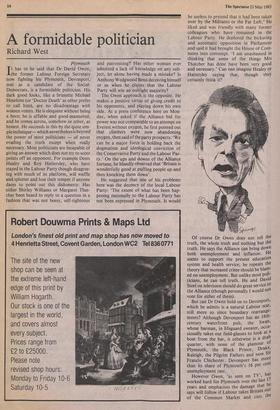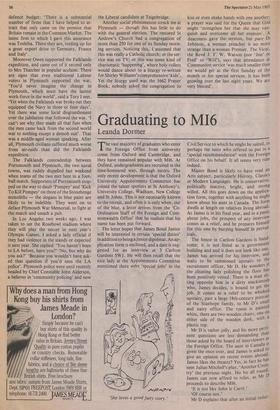A formidable politician
Richard West
Plymouth
It has to be said that Dr David Owen, the former Labour Foreign Secretary now fighting his Plymouth, Devonport, seat as a candidate of the Social- Democrats, is a formidable politician. His dark good looks, like a brunette Michael Heseltine (or 'Doctor Death' as other prefer to call him), are no disadvantage with women voters. He is eloquent without being a bore; he is affable and good-mannered; and he comes across, somehow or other, as honest. He succeeds in this by the quite sim- ple technique — which nevertheless is beyond the power of most politicians — of never evading the truth except when really necessary. Most politicians are incapable of giving an answer which does not try to score points off an opponent. For example Denis Healey and Roy Hattersley, who have stayed in the Labour Party though disagree- ing with much of its platform, will waffle and splutter and lose their temper if anyone dares to point out this dishonesty. Has either Shirley Williams or Margaret That- cher been heard to reply to a question in a fashion that was not bossy, self-righteous
and patronising? Has either woman ever admitted a lack of knowledge on any sub- ject, let alone having made a mistake? Is Anthony Wedgwood Benn deceiving himself or us when he claims that the Labour Party will win an outright majority?
The Owen approach is the opposite. He makes a positive virtue of giving credit to his opponents, and playing down his own side. At a press conference here on Mon- day, when asked if the Alliance bid for power was not comparable to an attempt on Everest without oxygen, he first pointed out that climbers were now abandoning oxygen, then said of the party prospects: 'We can be a major force in holding back the dogmatism and ideological conviction of the Conservative Party and the Labour Par- ty.' On the ups and downs of the Alliance fortune, he blandly observed that 'Britain is wonderfully good at puffing people up and then knocking them down'.
He suggested that one of his problems here was the decency of the local Labour Party: 'The extent of what has been hap- pening nationally to the Labour Party has not been expressed in Plymouth. It would
be useless to pretend that it had been taken over by the Militants or the Far Left.' He liked and was friendly with many former colleagues who have remained in the Labour Party. He deplored the bickering and automatic opposition in Parliament and said it had brought the House of Com- mons into contempt. 'I am unashamed in thinking that some of the things Mrs Thatcher has done have been very good and necessary.' Can one imagine Healey or Hattersley saying that, though they certainly think it?
Of course Dr Owen does not tell the truth, the whole truth and nothing but the truth. He says the Alliance can bring down both unemployment and inflation. He seems to support the present education system and health service; he repeats the theory that increased crime should be blam- ed on unemployment. But unlike most poli- ticians, he can tell truth. He and David Steel on television should do great service to the Alliance (though personally I would not vote for either of them). But can Dr Owen hold on to Devonport, which he admits is a natural Labour seat, still more so since boundary rearrange- ments? Although Devonport has an 18th- century waterfront pub, the Swan, whose barman, in lifeguard sweater, occa-
sionally takes out field-glasses to look at a boat from the bar, it otherwise is a drab quarter, with none of the glamour of Plymouth, the Black Prince, Drake, Raleigh, the Pilgrim Fathers and now Sir Francis Chichester. Devonport has more than its share of Plymouth's 16 per cent unemployment rate. However Owen, 'as seen on TV', has worked hard for Plymouth over the last years and emphasises the damage that he says will follow if Labour takes Britain out of the Common Market and cuts the defence budget: 'There is a substantial number of firms that I have helped to at- tract that only came on the premise that Britain remain in the Common Market. The latest firm to which I gave this assurance was Toshiba. There they are, tooling up for a great export drive to tiermany, France and Italy'.
Moreover Owen supported the Falklands expedition, and came out of it second only to Mrs Thatcher in popular acclaim. There are signs that even traditional Labour voters in Plymouth supported the war. `You'd never imagine the change in Plymouth, which must have the laziest work-force in the world', said a Tory I met. `Yet when the Falklands war broke out they equipped the Navy in three or four days'. Yet there was some local disgruntlement over the jubilation that followed the war. 'I can't see why they made all that fuss when the men came back from the second world war to nothing except a demob suit'. That was a middle-aged woman speaking. After all, Plymouth civilians suffered much worse from air-raids than did the Falklands expedition.
The Falklands comradeship between Portsmouth and Plymouth, the two naval towns, was rudely dispelled last weekend when teams of the two met here in a foot- ball match. Supporters of Portsmouth stop- ped on the way to daub 'Pompey' and 'Kick To Kill Pompey' on three of the Stonehenge monoliths — the slogans in blue paint are likely to be indelible. They went on to deface Plymouth War Memorial, to fight at the match and smash a pub.
In Los Angeles two weeks ago, I was taken to see the Rosebowl stadium where they will play the soccer in next year's Olympic Games. I asked a lady official if they had violence in the stands or expected it next year. She replied: 'You haven't been to LA before, have you?"No, but why do you ask?' Because you wouldn't have ask- ed that question if you'd seen the LA police'. Plymouth police were until recently headed by Chief Constable John Alderson, a believer in 'community policing' and now
the
the Liberal candidate at Teignbridge.
Another social phenomenon struck me at Plymouth — though this has little to do with the general election. The restored St Andrew's Church had a congregation of more than 250 for one of its Sunday morn- ing services. Noticing this, I assumed that this was really a Catholic church; or the ser- vice was on TV; or this was some kind of charismatic 'happening', where holy-rollers would dance about to a liturgy re-written for Shirley Williams's comprehensive 'kids'. Yet the liturgy used was the 1662 Prayer Book; nobody asked the congregation to
kiss or even shake hands with one another; a prayer was said for the Queen that God might 'strengthen her that she may van- quish and overcome all her enemies'. A deaconess gave the sermon, but pace Di Johnson, a woman preacher is no more strange than a woman Premier. The Vicar, the Revd J. F. W. Watson (not 'Jim' or Fred' or 'Wilt"), says that attendance at Communion service 'was much smaller than we would get at the first Sunday of the month or for special services. It has been growing over the last eight years. We are very blessed'.











































 Previous page
Previous page